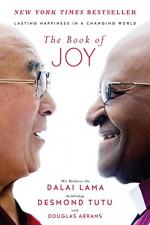
|
| Name: _________________________ | Period: ___________________ |
This quiz consists of 5 multiple choice and 5 short answer questions through Part IV (Pages 215 - 289).
Multiple Choice Questions
1. What is Archbishop Tutu's great regret regarding his father?
(a) He never told his father he loved him.
(b) He never told his father he knew that his father had loved him.
(c) He never told his father he would never forgive him.
(d) He turned down his father's request to talk very shortly before his father died.
2. What does the Dalai Lama say the Buddha's first teaching is?
(a) The inevitability of suffering and the transient nature of existence.
(b) The importance of gratitude.
(c) The importance of fighting our own anger.
(d) The inevitability of jealousy.
3. Which sociologist's research on loneliness does Abrams cite in Part II?
(a) Lauren Squandre.
(b) James Lavin.
(c) Biran Mowley.
(d) Lynn Smith-Lovin.
4. What does Archbishop Tutu think about developing one's sense of humor?
(a) It can only be taught by one's parents.
(b) It is innate.
(c) It is a skill to be cultivated.
(d) It can only be taught by a comedian.
5. Which part of the brain do some researchers think gratitude stimulates?
(a) The amygdala.
(b) The medulla oblongata.
(c) The hypothalamus.
(d) The frontal cortex.
Short Answer Questions
1. What role did Archbishop Tutu play in the Truth and Reconciliation Commission in South Africa?
2. Which primatologist believes that peace-making activities are extremely common in the animal kingdom?
3. What does the Dalai Lama say happens to people who have no difficulties and are always relaxed?
4. Who does Archbishop Tutu say are usually the hardest for people to forgive?
5. Archbishop Tutu says he feels that each individual is which of the following "in the making"?
|
This section contains 315 words (approx. 2 pages at 300 words per page) |

|




